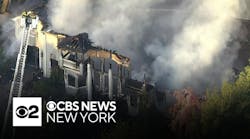I am amused by all the recent reports in the media of shark attacks in Florida and other places. Ironically, on Sept. 10, 2001, stories of shark attacks also filled the pages of local newspapers and the screens of our televisions. In fact, for the entire summer before Sept. 11, 2001, stories of shark attacks in Florida, up and down the East Coast and in the Caribbean were played out daily in newspapers, magazines, and network and cable television. Seaside resorts, hotels and beaches all reported a decline in people going into the water.
As I watched another shark story the other day, I thought, where did the sharks all go for the past four years? After 9/11, there were no more shark stories. Is it that the terrorists scared them away and they went out to sea to hide? I think not! Instead, the media no longer chose to cover shark attacks and instead focused on the attacks of 9/11 and homeland security issues. Also, since the spring of 2003, the media have predominantly filled our newspapers and televisions with reports regarding the war in Iraq and Afghanistan and the presidential election.
So what does the shark attack coverage mean to me? It means we are getting back to things as they were prior to 9/11. The media can certainly have a significant influence on public opinion. Based on what stories the media are covering, how they spin them and how the public receives the information, they can have tremendous persuasion over how priorities in our society are established.
Even on July 7, 2005, when bombings occurred on the London subway and bus, there were still stories of shark attacks on the evening news. Have we come full circle? Are terrorist attacks now a way of life that we can expect and accept, or has the lack of a terrorist attack on American soil since 9/11 made us complacent again?
Billions of federal dollars have been poured into programs to prevent and prepare us for another terrorist attack. Small communities that never envisioned having the latest and greatest gadgetry now marvel at the equipment they have received courtesy of the federal government. For years before 9/11, the fire service tried to get federal money handed out to fire departments in the same way the Justice Department doled out money to police departments. It took 9/11 to make that happen with the FIRE Act grants. But don't expect this pipeline of money to continue forever.
Are we better prepared to respond? Will we lose another 343 firefighters in the next operation by al Qaeda on our soil? We have poured billions into airline safety, but quite frankly, if you have sat next to anybody in an airplane and the conversation turned to 9/11, you would know that there will be no more terrorists taking over planes and using them as guided missiles into buildings. Passengers on airplanes will no longer sit idly by as a religious zealot crashes an aircraft in his goal to see Allah and be romanced by 72 virgins.
The greatest threat to the fire service right now is complacency. Lots of fire departments have shiny new trucks, the latest and greatest tools of the trade, and in the near future will have additional personnel because of the SAFER Act. We have made some strides with creating interoperability with radio channels, common terminology and approach to multi-agency responses with the National Incident Management System (NIMS), and bolstered our urban search and rescue teams, but are we prepared to handle whatever al Qaeda throws at us? It all depends on how innovative they are. We can expect them to try to disrupt our economy. That is the only way they can bring America to its knees. But at what expense will it be to the fire service?
This month, we honor the fourth anniversary of 9/11. The tremendous outpouring of support by citizens for their fire departments after those dreadful days has waned. Fire departments across the country report difficulty getting support for tax increases. Many tax initiatives on ballots for fire departments are defeated. Layoffs of firefighters in such cities as Buffalo, Pittsburgh and Detroit and even the closing of firehouses in New York City are common. A week-long front-page series in the St. Louis Post-Dispatch viciously attacked fire districts, elected officials and the IAFF Local. A newspaper in Sacramento draws a cartoon of firefighters raising a flag over the ruins of the World Trade Center, but instead of the stars and stripes of the American flag, the flag bears the Playboy bunny symbol. Decreased funding for the National Fire Academy is just a start and other reductions in federal programs that affect the fire service should be expected.
Bottom line, the fire service must guard against complacency. There is still much more to accomplish and our support may be diminishing. Excellent training programs, top-notch equipment, appropriate staffing levels, regional approaches and pooling of resources, plus more, are all things we should continue to strive for.
After four years, not only are the sharks back in the headlines, but they are starting to circle.
Gary Ludwig, MS, EMT-P, a Firehouse contributing editor, is deputy chief of EMS in the Memphis, TN, Fire Department. He has 28 years of fire-rescue service experience, and previously served 25 years with the City of St. Louis, retiring as the chief paramedic from the St. Louis Fire Department. Ludwig is vice chairman of the EMS Section of the International Association of Fire Chiefs (IAFC), has a master's degree in business and management, and is a licensed paramedic. He is a frequent speaker at EMS and fire conferences nationally and internationally. He can be reached through his website at www.garyludwig.com.





